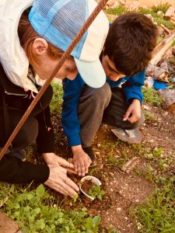Waldorf News
House of Hope: Waldorf Education in the West Bank Crisis Zone

From House of Hope
House of Hope elementary school takes a holistic approach to education in the West Bank crisis zone. Palestinian children often suffer excessive and prolonged activation of their bodies’ stress response systems due to violence from the Israeli/Palestinian conflict. In order to diminish their fear and stress to tolerable levels, Palestinian children, like those living in any war zone, shut down their senses and emotions.
This has debilitating individual consequences, as children exposed to toxic stress are at greater risk for developing a variety of cognitive, behavioral, and emotional difficulties. Unaddressed trauma also has negative implications for regional peace as nervous system suppression undermines their future capacity to respond nonviolently to their ongoing trauma, much less become agents of peace.

Traditional approaches to education for Palestinian children in the West Bank do not address trauma or decrease the likelihood that students will respond to the injustices they experience with violence.
House of Hope’s holistic learning environment gently and effectively supports students to overcome trauma-induced educational barriers and achieve academic and prosocial development goals. Students learn healthy coping skills, such as art and music expression, therapeutic body movement and other self-esteem affirming activities.

House of Hope is deeply inspired by the teachings of Rudolf Steiner, the founder of the Waldorf education movement, and is the only emerging Waldorf inspired elementary school in the West Bank.
In addition to creating a Waldorf learning environment, House of Hope staff also teaches students Nonviolent Communication, a healing approach to conflict resolution that gives them the skills to understand what triggers them, deepen their connection with themselves and others, and transform their habitual or unfolding responses to the injustices they experience.
House of Hope students also embrace cultural diversity as a strategy for healing in the “Beloved Community” curriculum that examines principles for love and forgiveness shared by the three Abrahamic religions: Christianity, Judaism, and Islam. During their summer holiday, House of Hope art, music and dance therapy programs are safe-havens for children who might otherwise be in the streets.

The impact of House of Hope’s life-giving work is documented by teachers who report students’ individual achievement in behavioral and academic areas. Many children start their time at House of Hope quiet and withdrawn, and with time, engage with their classmates and teachers and achieve academic goals.
 Over 60 students are currently enrolled in House of Hope’s K-3 school, and the administration anticipates opening a 4th and 5th grade in the 2018/2019 school year. It’s student achievement and community acceptance assert that House of Hope’s successful model for trauma-informed elementary education can be easily replicated throughout the West Bank.
Over 60 students are currently enrolled in House of Hope’s K-3 school, and the administration anticipates opening a 4th and 5th grade in the 2018/2019 school year. It’s student achievement and community acceptance assert that House of Hope’s successful model for trauma-informed elementary education can be easily replicated throughout the West Bank.
Learn more about House of Hope – just click here.
House of Hope. Locally referred to as Vision Association for Culture and Arts (VACA), House of Hope was cofounded by Milad Vosgueritchian and Manar Wahhab Vosgueritchian in 2008 as a community center for young Palestinian children coping with the stress of the surrounding Israeli-Palestinian conflict. A non-political, non-governmental organization, House of Hope serves the Palestinian villages of Al-Eizariya, Abu-Dees and Al-Sawahra in the eastern suburbs of Jerusalem.
 Transforming Voices Worldwide
Transforming Voices Worldwide The Journey is Everything
The Journey is Everything Association for a Healing Education
Association for a Healing Education Great books for Waldorf Teachers & Families
Great books for Waldorf Teachers & Families Waldorf EC Training & Intensives in Canada
Waldorf EC Training & Intensives in Canada Apply Today: New Cohort Starts Nov. 2025
Apply Today: New Cohort Starts Nov. 2025 Quality Education in the Heartland
Quality Education in the Heartland Full-Time Teacher Education
Full-Time Teacher Education Roadmap to Literacy Books & Courses
Roadmap to Literacy Books & Courses Immersive Academics and Arts
Immersive Academics and Arts Jamie York Books, Resources, Workshops
Jamie York Books, Resources, Workshops Resiliency and the Art of Education
Resiliency and the Art of Education Waldorf Training in Australia
Waldorf Training in Australia Summer Programs - Culminating Class Trips
Summer Programs - Culminating Class Trips Everything a Teacher Needs
Everything a Teacher Needs Waldorf-inspired Homeschool Curriculum
Waldorf-inspired Homeschool Curriculum ~ Ensoul Your World With Color ~
~ Ensoul Your World With Color ~ Train to Teach in Seattle
Train to Teach in Seattle Bringing Love to Learning for a Lifetime
Bringing Love to Learning for a Lifetime Middle School Science With Roberto Trostli
Middle School Science With Roberto Trostli
 Caring for All Stages of Life
Caring for All Stages of Life Bay Area Teacher Training
Bay Area Teacher Training Space speaks. Its language is movement.
Space speaks. Its language is movement. Flexible preparation for your new grade
Flexible preparation for your new grade RSS Feeds
RSS Feeds